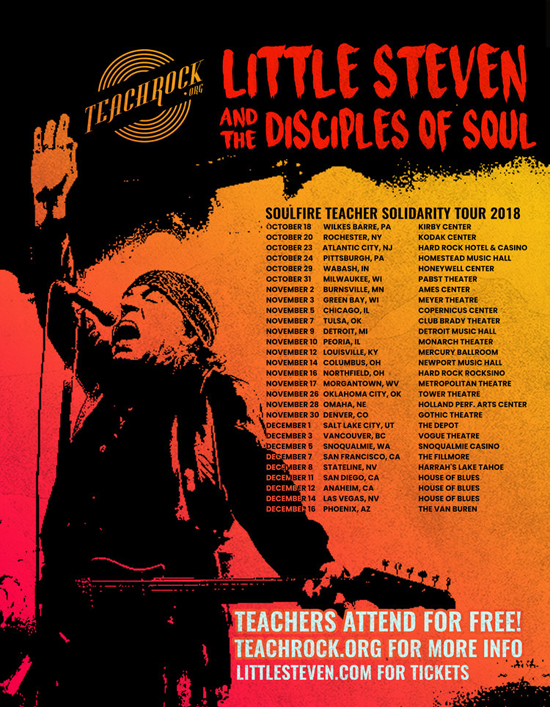
This month, Little Steven and the Disciples of Soul resume their Soulfire Teacher Solidarity Tour with a series of 28 American shows that will keep them on the road until shortly before Christmas, when Soulfire Live! will be released in vinyl and Blu-Ray formats. As before, teachers who sign up for the nightly TeachRock professional development workshops get free admission to the show.
"This will be the end of the Soulfire tour," tweeted Little Steven. "We're hitting the Midwest, all the states where teachers were on strike (or almost were) to show solidarity." This final U.S. leg begins October 18 in Wilkes Barre, PA, and these gigs will formally conclude a two-year cycle of recording and touring that began in London on October 29, 2016.
Backstreets has reported on Little Steven's every move since then, and we'll be posting regular reports this fall as he and the band travel from New Jersey to California, clocking up their 100th show en route. Although he intends to continue his solo musical career, it's understood that Little Steven has reserved the first few months of 2019 for other projects. A new studio album is currently being recorded in New York, and members of the band have taken to social media to extol its virtues.
"I must warn you now that this new album will surprise you," said Ed Manion. "It is off the charts and will be worth the wait when you finally hear it. We worked hard and gave it our all. Seriously, it's hard to describe what just happened here. You will love it!" During a phone-in interview on Tom Cunningham's Bruce Brunch on September 23, Little Steven said that the album will probably be released in May, two years after Soulfire. He later tweeted that it will feature 10 new songs. At the moment, a European tour is pencilled in for next summer.
To coincide with Little Steven's two-month tour and the final stretch of Springsteen on Broadway, we'll be publishing a brand-new print edition of Backstreets magazine. The centerpiece of the new issue will be one of the longest and most comprehensive recent interviews with Little Steven, conducted by longtime Backstreets contributor and Van Zandt historian Mike Saunders.
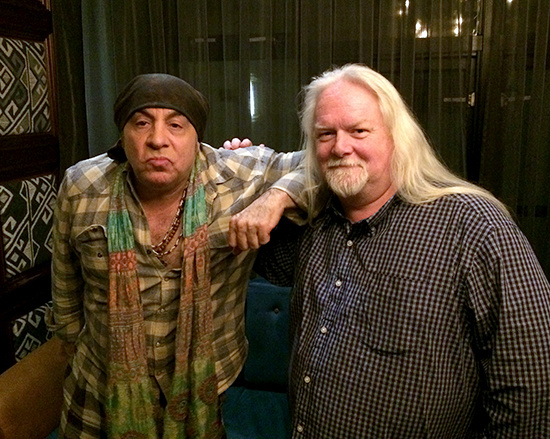
Arranging the sit-down
In April 2017, while he was working on an interview with Disciples of Soul Music Director Marc Ribler, Mike obtained a review copy of Soulfire from Little Steven's publicist Ken Weinstein. Buoyed by the success of his conversation with Marc, he asked about interviewing Little Steven for Backstreets.
"Ken said that I could probably speak to Steven on the phone," explains Mike, "but this might only have entailed a brief discussion about the new album, and I had more ambitious ideas. I wanted to talk face-to-face to Steven Van Zandt, the man behind the nicknames, aliases and character parts, about his entire life and career. Few of his recent interviews had been as wide-ranging as the one I had planned. I was thinking big and aiming high."
Little Steven said last year that Soulfire had re-introduced him to the world as a solo recording artist. Similarly, Mike wanted to remind the planet (and provide an education for newer converts) about Steven's many activities over the past five decades. During that time, he's played more than a thousand shows with the E Street Band, co-produced The River and Born in the U.S.A., written and produced material for Southside Johnny and the Asbury Jukes, made six solo albums, toured with the Disciples of Soul, masterminded the Sun City protest album, revived the careers of Ronnie Spector, Gary U.S. Bonds and Darlene Love, developed his acting talents in The Sopranos and Lilyhammer, created Little Steven's Underground Garage, and beaten Bruce Springsteen to Broadway with his Rascals musical.
And on the seventh day, he rested.
James Brown may always be remembered as "the hardest-working man in show business," but if the title ever becomes available again, it should be bestowed upon Little Steven.
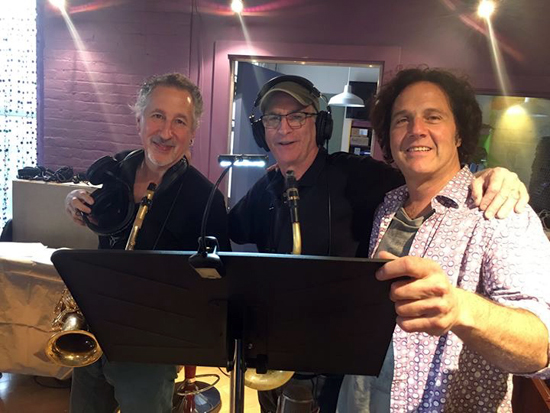
Disciples of Soul [L-R] Stan Harrison, Ed Manion, and Marc Ribler, Music Director
Backstreets ran Mike's review of Soulfire on May 19, 2017, the day it was released. He likened the album to a sumptuous banquet and urged readers to consume immediately for maximum enjoyment and well-being. "It hit the spot," says Mike. "Ken reported that 'Stevie loves the review,' adding soon afterwards, 'like, really loves it.' Three weeks later, I finished the final draft of my interview with Marc Ribler and sent it to him for last-minute checks. As a matter of courtesy, he ran it past his boss, who said, 'It's good. Nice job.' Steven was a man of few words, all of them complimentary. I'd now received the Van Zandt seal of approval twice within a month. A connection had been made." Backstreets ran the Marc Ribler interview on June 7, the opening night of the first Disciples of Soul tour in almost 30 years.
"I heard no more for several months and thought my chance had slipped away," says Mike, "but I reckoned without the persistence and determination of Holly Cara Price from Little Steven's office, who, knowing the intended breadth and scope of the interview, set about making it happen. We kept in touch during October and I sent a list of subjects that I wanted to discuss. Steven's response was simply 'yes.' He was a man of just one word this time, but it was the right one.
Interview possibilities were being considered when his U.K. tour began in November. The most likely location for us to meet was originally Liverpool, then it was Glasgow. Steven's media schedule was subject to change at a moment's notice, so I just had to bide my time, enjoy the shows, and await the green light. Finally, on November 15, Holly told me that I had a 5pm appointment at Steven's Newcastle hotel.
"In my best case scenario," Mike recalls, "Steven and I would talk, unaccompanied and uninterrupted, in a quiet room, on a day off, for at least an hour. It was a lot to ask — an impossible dream perhaps — but it happened exactly that way… with another hour thrown in."
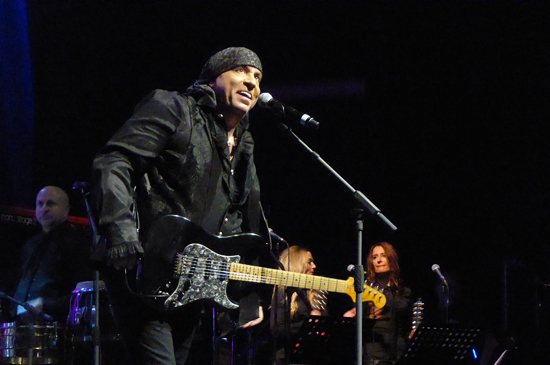
London with the Disciples, October 29, 2016 - photograph by Mike Saunders
The two-hour talk
Beginning with Steven's childhood in 1950s Boston and ending with the Soulfire tour, the interview passed through some familiar territory — such as his spontaneous creation of the "Tenth Avenue Freeze-out" horn arrangement — but also took the road less travelled: working construction in the early '70s; touring with the Dovells on the oldies circuit; filming Sopranos scenes during E Street tours, and producing Introducing Darlene Love.
To whet your appetite for this fascinating journey through Little Steven's back pages, we're including several excerpts here, which relate to his move to New Jersey at the age of seven; the Upstage Club and the preservation of historic venues; his political awakening in the '80s and its subsequent repercussions, and the resurgence of the Reunion-era E Street Band.
Two significant events took place when Steven was seven years old. The first was his mother's marriage to new partner Bill Van Zandt. "My new father adopted me and got me a Dutch name to forever confuse everybody." The second was their relocation to Middletown, New Jersey.
"It was a move to a suburb of developments, a new idea back then. We were the third house in the development. The head of construction was a black guy and had a son my age. We would play in those big dirt piles. That was interesting, when examining one's life. The first real friend I remember was black. Who knows what effect that has." Were these experiences emotionally challenging? "I didn't find it traumatic," he replies. "It was whatever was happening. I was very matter-of-fact about most things, not aware of much, just living in the moment."
Stepsiblings Billy and Kathi would follow. "Seven years younger for my brother and 10 for my sister, which is a shame — that's too much distance to share a life, you're into other things."
* * *
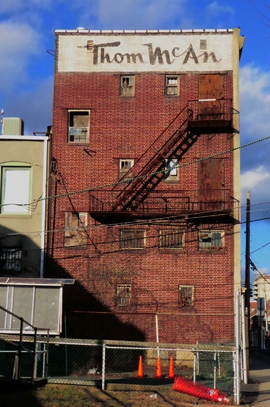 The Upstage lay dormant, dusty and deserted for almost half a century after it closed, but the building is now being converted into apartments. Steven had only recently returned to the club to be interviewed for Just Before The Dawn: Riot, Redemption, Rock 'n' Roll. How did he feel, going back after so long?
The Upstage lay dormant, dusty and deserted for almost half a century after it closed, but the building is now being converted into apartments. Steven had only recently returned to the club to be interviewed for Just Before The Dawn: Riot, Redemption, Rock 'n' Roll. How did he feel, going back after so long?
"I felt stupid," he admits. "It should have been preserved. One wall was down when I did that documentary. It seemed halfway to being destroyed." He suggests that the building could have been turned into a museum and become a major tourist attraction.
"I've known tourists coming to Asbury Park since Bruce broke through. That's not gonna stop. We fought half our lives trying to get the fuck outta there, but in historical fact, it's important. We could have bought the whole town for fucking 50 dollars. It was a wasteland for 25 years. Now it's starting to get built back up. These sacred sites of rock 'n' roll should be preserved. When they took the Bottom Line in New York it was a terrible day. Everybody broke there."
He also namechecks Max's Kansas City and CBGB's, "which I tried to save at the last minute, they came to me a little too late. Nobody gives a shit. We're stupid and we gotta be smarter than this, because these things are important."
* * *
One particular encounter was pivotal in dramatically reshaping Steven's worldview. "A kid asked me, 'Why are you putting missiles in my country?' I said, 'I'm not, I'm a guitar player.' I realized for the first time in my life, at the age of 30, I'm embarrassed to say, that I'm an American. What the fuck does that mean? I managed to grow up in the middle of civil rights, the Vietnam War, demonstrations about every fucking thing and had no interest in any of it. Amazing, when you think about it. Redefining tunnel vision.
"Suddenly, the tunnel is gone. We're now successful. Who would have ever figured that would happen? Now it's like, uh-oh, what did I miss, the last twenty years?"
Given the amount of finger-pointing that Steven was engaged in at the time, did he feel that his life was in danger? "It was threatened quite often," he confirms, alarmingly. "You start bringing down governments, people look at you like, 'Are we next?' You start taking on oil companies, people are gonna consider how dangerous you are to their well-being.
"The FBI were involved. A lot of conversations with law enforcement. I was worried about my wife and my dog. I wasn't worried about me. I was almost completely suicidal. I was so obsessed that I feared nothing. In the end, the cops told me you're gonna get a lot of these crazy people that say this shit, usually nothing happens. They get more interested after you're dead. Before then, don't worry about it.
"If I had kept going, I think I would have been in trouble. Big corporations started to exert pressure, and I basically got blackballed for a number of years."
* * *
"The Beatles were the first band I ever saw. 'Wow, this is different, this is about friendship, family and community.' That's something I can relate to, and I am quite sure that's what we communicated [in the E Street Band]. Yes, it was a hybrid of solo and band, it wasn't a traditional band, but we were a rock band for real. Not faceless sidemen. We had personalities. A band is personalities interacting with each other, creating something bigger than they can individually, by definition. We're getting bigger every single time we go out now."
I note that there are younger faces in their audiences these days, especially in Europe, where Bruce and the band exclusively play stadiums and festivals. "That's the only way you get bigger," says Steven. "That's really wonderfully rewarding. I'm so glad we did come back together and have re-established ourselves in a far more permanent way. We would have been a forgotten thing by now if we hadn't."
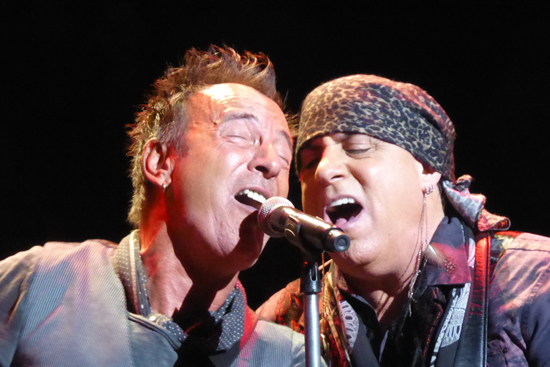
Los Angeles with the E Street Band, March 17, 2016 - photograph by Mike Saunders
"Steven was extremely generous with his time and proved to be an enthusiastic interviewee, growing increasingly more expressive as time passed," says Mike. "Mainly, Steven talked, and I provided occasional prompts to steer him in the right direction. His replies were thoughtful, honest, informative and entertaining. I was struck by his energy and passion. We discussed every stage of his life and career, ticking all the boxes in terms of my expectations. We would still only have scratched the surface if we'd had twice as long, but I was more than satisfied with the results of our conversation.
"We briefly met again after the Newcastle show the following night, and I thanked him a second time for sharing his memories, insights, opinions and observations. Having researched, chronicled, and enjoyed Steven's artistic endeavours for nearly four decades, it was a privilege to spend some quality time with the man who'd lived that extraordinary life and to walk away with an 18,000-word interview for Backstreets."
Backstreets # 92. Coming this fall. Featuring The Amazing Rock 'n' Roll Odyssey of Steven Van Zandt: From The Source to Soulfire via Springsteen and Sam and Dave. In full. In print. Indispensable.






